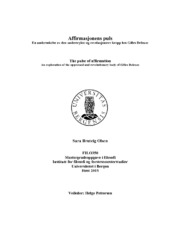Affirmasjonens puls. En undersøkelse av den undertrykte og revolusjonære kropp hos Gilles Deleuze
Master thesis
Permanent lenke
https://hdl.handle.net/1956/10763Utgivelsesdato
2015-11-23Metadata
Vis full innførselSamlinger
- Department of Philosophy [234]
Sammendrag
In this paper I will address the body as analyzed in the work of Gilles Deleuze and in his collaborations with Félix Guattari. I will attempt to explore the body as a decisive point of reference with regard to the human condition. I state that the body has been undermined as active and reflecting. As a result of neglecting the body in this regard, anxiety may arise, an experience of lack and oppression. Deleuze and Guattari argue against the structuralist and dualistic paradigm, and they search for a dissolving of the subject in favor of a pure becoming of multiplicities and intensities. Thus identities and the question of essence are abandoned, and our bodies are considered revolutionary becomings capable of liberating, and actively affirming life. I argue that the body has a privileged access to the experience of becoming, due to its own internal knowledge of mortality. This vulnerability is also what makes us capable of experiencing the affirmative powers of life. The challenges raised because of the structuralist and dualist paradigm concern the body's conditions as it often seems to oppress the body's own needs. Deleuze and Guattari pose analyses that show complex relations concerning what triggers different movements and becomings toward a variety of assemblages in the social and political sphere. I examine in particular Deleuzes´reading of the artist Francis Bacon, with regard to the bodily conditions relating to confronting the violent and ruthless aspects of life, by including and affirming these aspects. I also use Friedrich Nietzsche's work on the body as culturally and socially constituted in order to shed light on the human tendency towards experiences of guilt and lack. Deleuze and Guattari's body without organs is considered to constitute itself as either a full, empty or cancerous body. This paper attempts to bring to light the deleuzian possibility of a more healthy body constituted as full, when it is freed from suppressing conditions; a body that accepts its continuous loss and the inevitable risk of life, at the same time as it is affirmative and continuously becoming a new.
